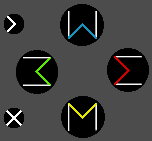Christoph.Krn
Advanced Member
Yeah, if it was being done by someone who doesn't know what he's doing, it could look cheap, but that can be avoided.
...resulting in stress or mild "user-panic", which leads to tunnel vision ("not seeing the forest for the trees"), which often results in a loop, yes.[...] i skipped out of a game about 3 times before i realized A wasnt either the A or B button.
YY
AA BB
XX
Hmm... have you ever brought this up before? If so, then I didn't remember, sorry.I Still think the best answer is multiple letter identifiers on the gaming buttons
[...]
That's where the use of something like Guihints comes in. If you are specifically designing a game for use on the Pyra's game button layout then you could use a pictogram representing the key. That would also mean that if you port the software to another device you can just substitute a different set of pictograms to provide device specific instructions. In text based instructions you could use a convention such as the use of brackets around the name to denote a button, which should make things clearer, especially if the convention is used fairly consistently.The only problem I envisage with key ids like AA, XX etc. is that fighting games often list moves as a sequence of keys - PPK (punch, punch, kick) may be XXA. People who haven't observed the key legends closely might assume they need to hit a key twice when presented with an instruction like 'Press BB to continue'.
I may not have presented the idea in precisely this manner before, but I'm certain I raised the idea of multiple latin character labels in at least one of the long button label threads.Hmm... have you ever brought this up before? If so, then I didn't remember, sorry.I Still think the best answer is multiple letter identifiers on the gaming buttons
[...]
I haven't thought this through yet, but so far I'm tempted to agree that double letters might achieve a similar thing as the parentheses would.
Most gamepads (e.g. Playstation controllers) don't have button letters/symbols that help you know where they're located (except for triggers R and L). That's because you don't really think, "Let me hit the circle button to use this powerup", you get muscle memory after a few looks.It has been voted over, and it wasn't favoured. Nor can it be defended in relation to the concerns that have been brought up, but you are welcome to try. I dont see for example, any connection to PageUp, PageDn, Home and End.
Here is why i think the baby is thrown out with bathwater.
Ask regular people, what they think the (greek) symbols look like. What are their names. Then take it away and ask how they relate to direction.
report back with results. Teaching people greek is what the buttoncluster should be doing.
Still to this day I can't automatically remember which way round square and circle are on a PS pad. I can reason out that since the Japanese use O for yes and that must be in the Nintendo A-button position, on the right, but prompt me to press square on screen and I still have to look down at the pad. Muscle memory works as you say, it's only QTE type things that mess me up, which perhaps is why I've not learned where square and circle are definitively, but on a pad with numbered or lettered buttons, I don't have to learn anything (other than whether it's Nintendo or SEGA layout).Most gamepads (e.g. Playstation controllers) don't have button letters/symbols that help you know where they're located (except for triggers R and L). That's because you don't really think, "Let me hit the circle button to use this powerup", you get muscle memory after a few looks.
It's not simply the people, it's also the software. After all, depending on how a software is made, it can be quite time-consuming or complicated to retrofit Greek characters into it. I think you may know this, I'm just noting it here for everyone.I think people are able to learn (Greek letters, and even the positionings), but sometimes they are extremely averse to new things.
Hmm, I would think that it's the developer's/maintainer's responsibility at that point, in anticipation of the users' expectations, similarly to how she would have to somehow ensure a clear distinction between "A" (Gaming button) and "A" (Keyboard key) if there were no parentheses. The parentheses format is not a "perfect" solution, just an approximation, and like it says in the opening post of this thread, I do "_not_ attempt to solve a specific subset of problems in a perfect way".[...] I could see this making a difference in something like a dungeon crawler, which tend to have large numbers of commands. If you have one command on "(A)" and another on "A" and you don't end up having to use either one until about 20 minutes after initially reading the help screen to get started it would be easy to misremember which was which.
No, not if you do it "right".[...] Parentheses on the buttons will look ugly, [...]

